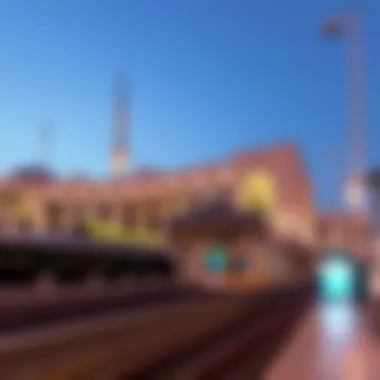Timings of Ibn Battuta Metro Station in Dubai


Intro
Navigating the urban landscape of Dubai can be a bit of a juggling act, especially when it comes to understanding public transport schedules. Among the various transit options in this bustling city, Ibn Battuta Metro Station stands out as a key player. Not only does it link commuters to several major destinations, but grasping its operating hours is essential for both the casual traveler and those who rely on it daily.
This guide will outline the optimal timings of Ibn Battuta Metro Station, digging into its significance within the larger framework of Dubai's public transportation system. With a clear focus on peak hours, regular schedules, and how these factors intersect with broader market trends, we aim to provide a comprehensive resource for anyone looking to navigate this vibrant metropolis more effectively.
By dissecting the operational hours of Ibn Battuta Metro Station, we can help commuters plan thoughtfully, taking into account the ebb and flow of passenger traffic and travel patterns that influence when it's best to embark on their journeys. Whether you're a resident, an expatriate, or a new visitor, this guide aims to smooth the path for your travels across Dubai.
Market Trends
Understanding the timing dynamics at Ibn Battuta Metro Station is more than just about catching a train; it's about recognizing how these factors play into wider trends in urban transport.
Current Market Overview
As Dubai continues to grow at an unprecedented pace, the demand for efficient public transportation solutions remains high. The city has invested heavily in infrastructure, with metro services expanding to accommodate the influx of residents and tourists alike. The Ibn Battuta Metro Station, located along the Red Line, sees a significant volume of foot traffic daily.
Recent data indicates that metro usage spikes before and after major work hours, reflecting the patterns of professionals commuting to and from business hubs across the emirate. This has led to an increased urgency for the metro to align its schedules with the demands of the labor force and visitors who flock to the shopping centers nearby as well.
Predictions for Future Developments
Looking ahead, several developments are anticipated that will further influence the operation of Ibn Battuta Metro Station. Expansion plans include integrating the Dubai Metro system with newer transit developments, like the Hyperloop and more extensive bus routes. Such additions could shift patterns in commuter requirements, decreasing pressure during rush hours and enhancing the overall service quality.
Additionally, as projects such as Expo 2020 and the development of new residential areas continue, we can expect an uptick in ridership. The need for smooth integration between various modes of transport will be necessary to fulfill these emerging demands without overwhelming the existing infrastructure.
This foresight not only aids in strategic planning for public transit authorities but also serves as a guideline for travelers mapping out their journeys in a rapidly evolving city.
Quote: "A well-timed transit schedule can change the game, reducing wait times and enhancing the overall quality of the travel experience."
To ensure a seamless experience, it’s vital for regular commuters and new residents alike to stay informed on these trends. In the next sections, we'll delve into peak hours and the implications of these operational schedules, providing insights essential for effective journey planning.
Overview of Ibn Battuta Metro Station
Ibn Battuta Metro Station holds deligit significance within the intricate transport framework of Dubai. Located amidst bustling commercial and residential areas, it serves as a vital junction for commuters, expats, and tourists alike. With a name that resonates with cultural heritage, the station is not just a stop on the Red Line; it embodies the spirit of exploration that Ibn Battuta himself represented.
Location and Accessibility
Positioned conveniently near key landmarks such as the Ibn Battuta Mall and various residential districts, the station is a boon for daily travelers. Its strategic location means easy access not only for residents but also for visitors exploring the vibrant surroundings. The metro station is well-connected to major roads and public transport options, making it straightforward to navigate to and from the station.
For those relying on public transport, dedicated bus routes and taxi stands adjacent to the station enhance accessibility. This seamless integration of services means that commuters can change modes of travel with greater ease. The location is also enriched by shopping and dining options, making it a favored spot for not just travel, but also leisure.
Importance in Dubai's Transport Network
Ibn Battuta Metro Station is more than just a mode of transport; it is an essential cog in Dubai's ever-evolving transport network. Its contribution to reducing traffic congestion is noteworthy, offering a reliable alternative to private vehicles. By facilitating smooth, efficient travel across the city, it plays a pivotal role in supporting Dubai's urban mobility goals.


The station also connects key destinations, thereby underscoring its importance in linking various neighborhoods and commercial hotspots. This connectivity promotes economic activities by making commuting simpler for workers and shoppers alike. As we delve deeper into the timings and operational schedules of Ibn Battuta Metro Station, it becomes evident that understanding these factors can significantly enhance one's commuting experience, ensuring that moving through Dubai is as effortless and time-efficient as possible.
"Public transport like the metro is essential for the sustainability of urban life, reducing reliance on cars and helping in modern city planning."
Through this exploration, we can appreciate how Ibn Battuta Metro Station stands at the crossroads of history and modernity, facilitating not just movement, but the very fabric of daily life in Dubai.
Regular Operating Hours
Understanding the regular operating hours of Ibn Battuta Metro Station is essential for anyone using this important transit hub in Dubai. These hours dictate how easily commuters can plan their journeys, ensuring they can get from point A to point B without a hitch. When you dive into the scheduling of a metro station like Ibn Battuta, it becomes clear how integral it is to the flow of daily life in a bustling city.
Weekday Timings
During weekdays, the Ibn Battuta Metro Station operates from 5:30 AM until midnight. This timing caters to the early birds heading to work while also accommodating late-night travelers coming back from the city. The consistency in timing provides a reliable backbone for the entire transport system.
- Morning Rush: Early in the morning, around 7:00 AM, the station sees a surge of commuters. Many individuals are making their way to business districts, schools, and other essential locations. It’s advisable for commuters to arrive ahead of their desired travel time to avoid the hustle and bustle at this hour.
- Midday Pace: Between 9:00 AM and 3:00 PM, the station operates with manageable foot traffic. This is a good window for anyone looking to get around town without the interference of large crowds.
- Evening Flow: As the workday wraps up, people flock back to the station, especially between 5:00 PM and 7:00 PM. To ease this congestion, it’s prudent to plan your journey with these peak hours in mind.
Weekend and Holiday Schedules
When it comes to weekends and holidays, the operating schedule of the Ibn Battuta Metro Station shifts slightly. The hours extend from 10:00 AM to 1:00 AM the following day on Fridays, while Saturdays run from 10:00 AM to midnight. On Sundays, the timings revert back to those of a weekday. This alteration offers more flexibility for leisure travelers and families.
- Friday Mornings: Many in Dubai enjoy their Fridays as a day of rest before the workweek starts again. Since the metro opens late, it tends to have a more relaxed atmosphere in the morning hours. However, as the day proceeds, foot traffic gradually builds until the evening.
- Saturday Leisure: The extended hours on Saturdays allow families and groups of friends to explore the city without the general weekday rush, promoting a leisurely pace of travel.
- Holidays: During public holidays, travelers can expect similar operating times as weekends. This pattern allows individuals to take full advantage of the city's attractions without worrying about getting stuck in traffic.
In summary, understanding the regular operating hours of Ibn Battuta Metro Station enables efficient planning. Whether you are a daily commuter or occasionally visiting, knowing when the trains run is key to navigating the vibrancy of Dubai with ease.
Peak vs Off-Peak Hours
When talking about transport networks, especially in a bustling city like Dubai, understanding peak and off-peak hours can be a game changer. For frequent travelers and first-time visitors alike, these timings can make or break a journey. The Ibn Battuta Metro Station, as a significant transit hub, experiences fluctuations in its passenger volume throughout the day. Therefore, grasping when these ebbs and flows occur is crucial for better travel planning.
Identifying Peak Times
Peak hours typically shine a harsh light on the bustling nature of urban commuting. At Ibn Battuta Metro Station, these times coincide with the start and end of the workday. Generally speaking, 7 AM to 9 AM in the morning and 5 PM to 7 PM in the evening stand as the busiest intervals. During these periods, commuters flood the platforms in pursuit of their daily routines, creating a lively, albeit hectic, atmosphere.
Notably, this surge isn't simply about numbers; it's also about the experience. Platforms can become crowded, and trains may see a staggering influx of passengers. The traveling public can witness standing room only, and even that feels tight at times.
Aside from weekdays, there are also peak times during weekends, especially during events, shopping sprees, or festivals. The social pulse of the city doesn't slow down on weekends, which is worth noting for those looking to enjoy leisure activities without the hassle of heading out during the busiest hours.
Impact on Commuter Experience
The effects of peak hours extend beyond just crowded trains and delayed schedules. For the daily commuter, these busy pockets of time can influence the overall travel experience significantly. A rider's journey may include longer waits for trains and more confrontations with fellow passengers. The accessibility to seating becomes a challenge, and the pressure to jostle for space heightens frustration levels.
In contrast, navigating the metro during off-peak times—generally defined as times outside the morning and evening rush—allows for a much smoother and calmer experience. Commuters often find themselves with ample room to breathe, and the luxury of available seats becomes a reality. Not only does this make the journey more pleasant, but it can also lead to better utilization of time.
In essence, choosing to travel during off-peak hours can transform a routine commute into a serene experience, making it an attractive option for various users ranging from expatriates to investors. Less congestion on trains and platforms means that travelers can enjoy the comfort of their journeys without feeling rushed.
"Timing can turn a chaotic ride into an enjoyable journey, if only based on the simple act of planning ahead."


To sum it up, being attuned to these peak and off-peak hours can enhance the commuting experience through the Ibn Battuta Metro Station greatly, defining the way individuals navigate through the vibrant, urban maze of Dubai. Local resources like RTA provide up-to-date information on metro operations, which can be a handy tool for both residents and visitors alike.
Factors Influencing Station Timings
The operational timings of the Ibn Battuta Metro Station are shaped by various elements that ensure both efficiency and user satisfaction. Understanding these factors allows commuters to navigate their journeys with more precision. There are two primary strands under this topic: maintenance and operational considerations, as well as the regulatory frameworks that govern public transport systems.
Maintenance and Operational Considerations
Regular maintenance is crucial for the smooth functioning of Ibn Battuta Metro Station. Stations are not just platforms; they are systems that require constant vigilance. Scheduled inspections and maintenance routines make certain that the station operates effectively, minimizing delays or incidents that could disrupt service. These maintenance activities might include, but aren't limited to:
- Equipment Checks: Regular checks ensure that trains run safely and smoothly.
- Infrastructure Upkeep: Addressing wear and tear of both physical structures and tech systems guarantees safety for all users.
- Emergency Preparedness: Routine drills help staff respond effectively in case of an emergency, affecting how quickly service can resume.
Such operational considerations mean there could be times when services are reduced or adjusted to facilitate necessary work. Commuters should take note of these schedules, often communicated in advance, so there are no surprises during their travels.
Government Regulations and Policies
Government regulations play a vital role in influencing the station timings. Regulatory bodies oversee transport systems to ensure safety, efficiency, and accessibility. In Dubai, the Roads and Transport Authority (RTA) is pivotal in setting guidelines that can affect when the Ibn Battuta Metro Station operates. Some impactful policies include:
- Safety Regulations: Strict adherence to safety protocols can lead to operational adjustments, ensuring public safety at all times.
- Public Demand Adjustments: Changes in commuter patterns or population density in areas served by the station might prompt changes to service frequency or hours.
- Event-based Adjustments: Large public events, both local and international, often require extra services or extended hours to accommodate increased commuter numbers.
These elements work together to shape the operational landscape of the Ibn Battuta Metro Station. Commuters must remain aware of how both maintenance and policies can influence their travel plans, offering a logical roadmap to integrating public transport into their daily routines.
"Understanding the governing factors of transport timings is crucial for navigating urban mobility effectively."
For more information on public transport regulations, you can check resources like RTA official website.
Comparison with Other Metro Stations
Timings of Nearby Stations
Nearby stations like Mall of the Emirates and Dubai Marina provide valuable context. They not only share the same operational framework but also cutting-edge timing schedules that can influence commuter choices. Here’s a look at their standard operating hours:
- Mall of the Emirates Station:
- Dubai Marina Station:
- Weekdays: 6 AM to Midnight
- Weekends: 6 AM to 1 AM
- Weekdays: 6 AM to Midnight
- Weekends: 6 AM to 1 AM
By comparing these schedules, it's apparent that Ibn Battuta, operating from 6 AM to 11 PM on weekdays and 6 AM to 12 AM on weekends, falls somewhat in the middle. This positioning may benefit the station as it balances weekday commuters and weekend revelers effectively.
Travel Time Estimates Between Stations
When analyzing travel time between Ibn Battuta and other stations, it’s a mixed bag of efficiency and sophistication. The smooth and timely service of the metro means that commuters can predict their travel duration quite accurately:
- Ibn Battuta to Mall of the Emirates: Approximately 15 minutes
- Ibn Battuta to Dubai Marina: Roughly 20 minutes


These times suggest that although Ibn Battuta's hours may seem limited, the actual time spent commuting does not put users at a disadvantage compared to other stations. With no transfer required between these particular routes, convenience is evident.
"Well-planned travel, especially considering metro timings, can save time and enhance the commuting experience for many users in the bustling city of Dubai."
In essence, understanding the comparative timings and travel duration can greatly influence how individuals plan their daily journeys. Ultimately, it’s all about finding the best balance between convenience and opportunity within a dynamic transit system.
User Insights and Experiences
When discussing the operational timings of Ibn Battuta Metro Station, it’s crucial to delve into user insights and experiences. Understanding how everyday commuters interact with the scheduling not only provides a clearer picture of the station's efficacy but also highlights areas where improvements could be made. Through feedback and real-life examples, we can capture the real-world importance of these operating hours and how they fit into the larger transport narrative of Dubai.
Commuter Feedback on Timings
The way commuters perceive the timings of Ibn Battuta Metro Station has a significant influence on their daily routines. Many users report their experiences with timeliness, convenience, and overall satisfaction with the service.
- Convenience: Numerous commuters express appreciation for the flexibility that the metro’s operating hours offer, particularly during peak travel times. When the first train departs and the last train arrives punctual, it helps those who might be juggling jobs, commitments or school schedules.
- Timeliness: Feedback regarding punctuality is often mixed. While many praise the station for adhering closely to schedules, others highlight instances where delays occur. Such delays can lead to increased stress, especially for those catching connecting transport or attending time-sensitive appointments.
"The metro makes it easy to get around Dubai, but sometimes I wish it ran a bit longer in the evenings for those of us leaving work late." - Daily commuter.
- Suggestions for Improvement: Many users express a desire for extended evening hours on weekdays or additional services on weekends. This feedback points to a growing need for responsiveness to commuter needs, particularly as the city continues to evolve and its population expands.
Case Studies of Daily Commuters
Diving deeper into the daily lives of commuters provides valuable context on how the timings at Ibn Battuta Metro Station impact various demographics. For instance, consider the following case studies:
- The Student: A university student relies on the metro for her daily commute. The early morning timings align perfectly with her class schedule. She appreciates the consistent service, however, often mentions that the limited late-night service makes it hard for her to attend study groups that run late into the evening.
- The Working Professional: A businessman who travels frequently uses the metro to avoid the notorious traffic in Dubai. His feedback reveals that the smooth, timely service allows him to plan meetings without unnecessary stress related to delays. He suggests that perhaps additional trains during rush hour would ease crowding.
- The Family: A family utilizing the metro finds it ideal for outing trips. They benefit from the convenience during weekends but cite that the service could be more accommodating during public holidays, where family outings see a spike in usage.
Understanding these user experiences provides essential context for future operational considerations at the Ibn Battuta Metro Station. By aligning the metro's hours with the evolving needs of its user base, the transport authority could enhance the overall commuting experience, which in turn could lead to increased reliance on public transport throughout Dubai.
Future Developments and Changes
The future operates at the intersection of passenger needs and infrastructural growth. As the demands of Dubai's bustling population evolve, so too must the provisions at Ibn Battuta Metro Station. Recognizing the station's pivotal role in this metropolitan maze, it’s essential to look ahead and understand potential changes that can refine commuter experiences and improve the station's functionality.
Potential Changes in Timings
As Dubai continues to develop, changes to the operating hours of Ibn Battuta Metro Station may become necessary. Seasonal variations, special events, or shifts in commuter patterns could prompt adjustments in how late or early the station operates. For instance, during the bustling months of Expo events, the station may extend its hours to accommodate increased foot traffic. Conversely, in quieter periods, the timings might be trimmed to optimize resources.
- Flexibility: Adjusting timings based on real-time data collected from user patterns can enhance the efficiency of the service.
- Commuter Benefits: Shifting the focus on peak and off-peak hours can improve the passenger experience, ensuring that the trains run with maximum efficiency at the most critical times.
- Feedback Loop: Engaging with regular commuters through surveys could inform management about their needs and preferences regarding operational hours.
These changes will not only serve immediate transportation needs but will also set the groundwork for future enhancements in Dubai's complex transit web.
Infrastructure Expansion Plans
With the surging population and an ever-growing influx of visitors, infrastructure expansion around the Ibn Battuta Metro Station is not just an option; it’s a necessity. Planning and development for expansions might include more access points, integration with additional modes of transport, or even enhancements within the station itself to better accommodate passenger flow.
- Future Connectivity: The prospect of seamlessly connecting to other transport modes like buses, trams, and ride-sharing services is critical. This would enhance the network, making it easier for commuters to transition between the metro and other forms of transportation.
- Modernization Efforts: Expanding facilities might include better signage, upgraded technology for ticketing, and even mobile apps for real-time updates about train schedules.
- Sustainability Initiatives: With an eye toward environmental impact, future plans may also consider eco-friendly facilities tucked within the infrastructure, such as sustainable energy sources for power.
To put it simply, enhancements at the Ibn Battuta Metro Station can be a cornerstone for urban planning, creating a transport hub that meets the demands of a growing, vibrant city. This will not only benefit commuters but also positively impact investors looking to engage with Dubai's real estate market, as convenient transport options heighten property values and boost local economies.
"Adapting to change in a city as dynamic as Dubai is not just necessary; it's vital for sustainable growth."
As we peer into the horizon of public transport at Ibn Battuta, planning for the future ensures that this vital station remains a beacon of connectivity, convenience, and commercial vitality in Dubai.



